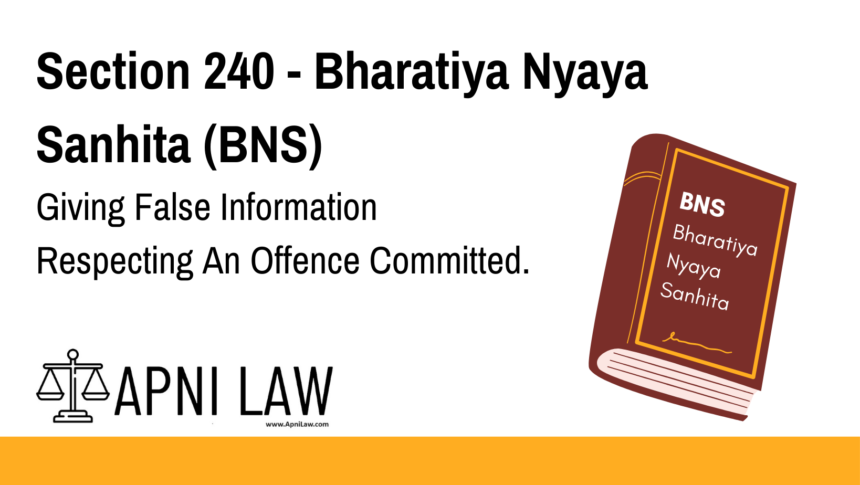Code: Section 240 BNS
Whoever, knowing or having reason to believe that an offence has been
committed, gives any information respecting that offence which he knows or believes to
be false, shall be punished with imprisonment of either description for a term which may
extend to two years, or with fine, or with both.
Explanation.—In sections 238 and 239 and in this section the word “offence”
includes any act committed at any place out of India, which, if committed in India, would
be punishable under any of the following sections, namely, 103, 105, 307, sub-sections (2),
(3) and (4) of section 309, sub-sections (2), (3), (4) and (5) of section 310, 311, 312,
clauses (f) and (g) of section 326, sub-sections (4), (6), (7) and (8) of section 331,
clauses (a) and (b) of section 332.
Explanation of Section 240 BNS
Section 240 of the Bharatiya Nyaya Sanhita (BNS), 2023, penalizes individuals who knowingly provide false information regarding an offence. This law ensures that the justice system is not misled by fabricated reports or misrepresented facts.
Key Elements of Section 240 BNS
- Knowledge of an Offence – The person must know or have reason to believe that an offence has been committed.
- False Information – The person must intentionally provide false details about the offence.
- Punishment –
- Up to 2 years imprisonment, or
- Fine, or
- Both.
- Applicable to International Offences – The law also applies to offences committed outside India that fall under specific BNS sections.
Illustration
Example 1: Fake Police Complaint
A person falsely reports a robbery that never occurred to claim insurance money. Since this is knowingly false information, they can be punished under Section 240 BNS with imprisonment of up to two years or a fine.
Example 2: Misleading Authorities in a Murder Case
A witness intentionally tells the police that Person A committed a murder, knowing that Person B is the real offender. This is a deliberate attempt to mislead the investigation, punishable under Section 240 BNS.
Common Questions and Answers on Section 240 BNS
1. What is the purpose of Section 240 BNS?
- To prevent people from misleading law enforcement by providing false information about an offence.
2. How is false information defined under this section?
- Any deliberate misrepresentation or fabrication of facts related to an offence qualifies as false information.
3. What are the punishments under Section 240 BNS?
- The guilty person may face:
- Up to two years imprisonment.
- A fine.
- Both imprisonment and fine.
4. How is this section different from Section 238 BNS?
- Section 238 BNS punishes those who destroy or conceal evidence to protect an offender.
- Section 240 BNS punishes those who intentionally provide false information about an offence.
5. Can a person be punished under Section 240 BNS for an honest mistake?
- No. The section applies only when the person knowingly provides false information. Genuine mistakes do not attract punishment.
Conclusion
Section 240 BNS is crucial for maintaining the credibility of law enforcement investigations. It ensures that individuals do not misuse legal processes by filing false reports or misleading authorities.
For expert legal guidance, visit ApniLaw today! 🚀











